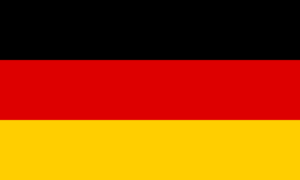
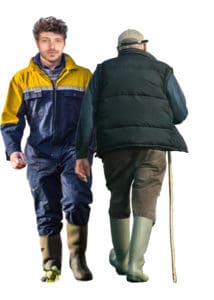 Given the importance of land mobility (i.e. transfer of land from one farmer to another, or from one generation to the next) in achieving generational renewal in agriculture, and the extent to which low levels of mobility can hinder structural development and growth within the farming sector, increasing access to land for young farmers and new entrants across EU Member States is one of the European Commission’s key priorities in the upcoming CAP reform (Dwyer et al., 2019). The limited supply of land available for purchase or secure rental in several European countries however, in addition to the prevailing high price of land that is available, have resulted in extraordinary socio-economic challenges for new entrants aspiring to pursue farming as a career however, as well as for young farmers seeking additional land to develop a more viable farming enterprise (Zagata et al., 2017; Conway et al. 2019).
Given the importance of land mobility (i.e. transfer of land from one farmer to another, or from one generation to the next) in achieving generational renewal in agriculture, and the extent to which low levels of mobility can hinder structural development and growth within the farming sector, increasing access to land for young farmers and new entrants across EU Member States is one of the European Commission’s key priorities in the upcoming CAP reform (Dwyer et al., 2019). The limited supply of land available for purchase or secure rental in several European countries however, in addition to the prevailing high price of land that is available, have resulted in extraordinary socio-economic challenges for new entrants aspiring to pursue farming as a career however, as well as for young farmers seeking additional land to develop a more viable farming enterprise (Zagata et al., 2017; Conway et al. 2019).
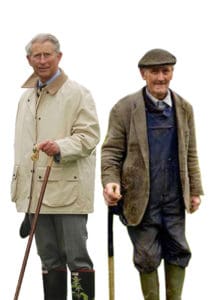 Furthermore, stubborn adherence to traditional patterns of inheritance, combined with the senior generation’s reluctance to release their grip on the business, often results in the younger generation having to wait 20 to 30 years to assume managerial control and ownership of the farm (Conway et al., 2017). Keating (1996) notes that such a long period of family apprenticeship is ‘analogous to that of Prince Charles, heir to the British throne (p. 414). His mother, Queen Elizabeth II, is still in control. By the time Prince Charles succeeds to the throne, his own son will be ready to assume the role and somewhat ironically his son, Prince William, may also find himself spending most of his adult life as an apprentice in the family business’ (ibid). This predicament may also be the case for many ‘younger’ farmers worldwide, resulting in significant difficulties gaining access to land (Ingram and Kirwan, 2011).
Furthermore, stubborn adherence to traditional patterns of inheritance, combined with the senior generation’s reluctance to release their grip on the business, often results in the younger generation having to wait 20 to 30 years to assume managerial control and ownership of the farm (Conway et al., 2017). Keating (1996) notes that such a long period of family apprenticeship is ‘analogous to that of Prince Charles, heir to the British throne (p. 414). His mother, Queen Elizabeth II, is still in control. By the time Prince Charles succeeds to the throne, his own son will be ready to assume the role and somewhat ironically his son, Prince William, may also find himself spending most of his adult life as an apprentice in the family business’ (ibid). This predicament may also be the case for many ‘younger’ farmers worldwide, resulting in significant difficulties gaining access to land (Ingram and Kirwan, 2011).
As every farm and farmer is unique throughout Europe, there are no uniform or easily prescribed solutions to resolving the intergenerational farm transfer and land mobility conundrum. Innovative ‘match-making’ models of collaboration between generations to help young people commence and develop their farming careers known as ‘Joint Farming Ventures’ (JFVs) however have been advocated within policy discourses as ideal stepping stones to help overcome obstacles to land access by enabling young farmers to become formal partners in the family farm business. JFVs including arrangements such as farm partnerships, share farming and contract rearing, also allow the older generation to remain active and embedded in the farming community in later life, something that is considered to be crucial to their mental health and wellbeing (Conway et al. 2019).
Match-making people and land throughout Europe
Examples of policy initiatives and farmers’ projects in existence throughout Europe that are successfully addressing challenges in generational renewal by linking farmers to available land, as well as connecting new farmers with older ones, leading to a better return for all parties involved, are listed below:
Ireland
Land Mobility Service
The Irish Land Mobility Service was established in 2013. It is a dedicated, proactive support service for farmers and farm families who are contemplating expansion, changing enterprise, or stepping back from farming. It provides a confidential and independent match-making service to introduce older farmers and/or landowners with young people who want to develop their own career in farming in order to establish sustainable and mutually beneficial business arrangements. The main aim of the service is to facilitate access to land through various forms of collaborative farming arrangements. Since its inception the service has been involved in excess of 500 arrangements covering more than 47,000 acres (19,020 hectares). Today, the Service actively engages with over 200 people who are either looking for opportunities or their options. These people fall into three categories: landowners who wish to retire, new entrants to Farming, and existing farmers looking to expand.
More information can be found at: http://landmobility.ie/
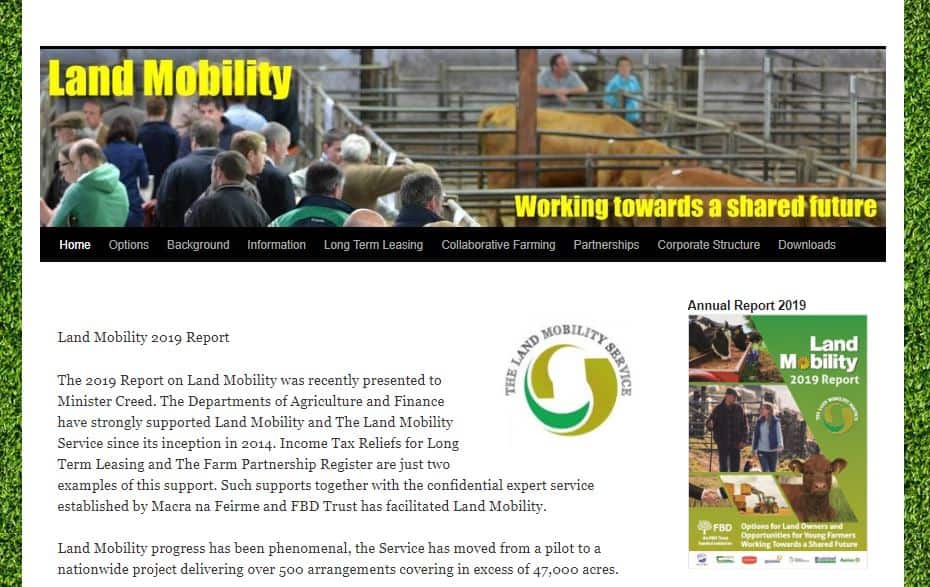
Austria
Perspektive Landwirtschaft (Perspective Agriculture)
In Austria, NEL, a non-profit Austrian association supporting new entrants into farming and raising awareness on farm succession by means of adult education, information, advice and research have been providing a matching programme called Perspective Agriculture (Perspektive Landwirtschaft) since December 2017. This farm start-up platform connects farmers without a successor to prospective, aspiring farmers. The programme’s website provides information on extra-familial farm succession and farm start-ups and collects contacts legal consultants by region for example.
More information can be found at: https://www.perspektive-landwirtschaft.at/
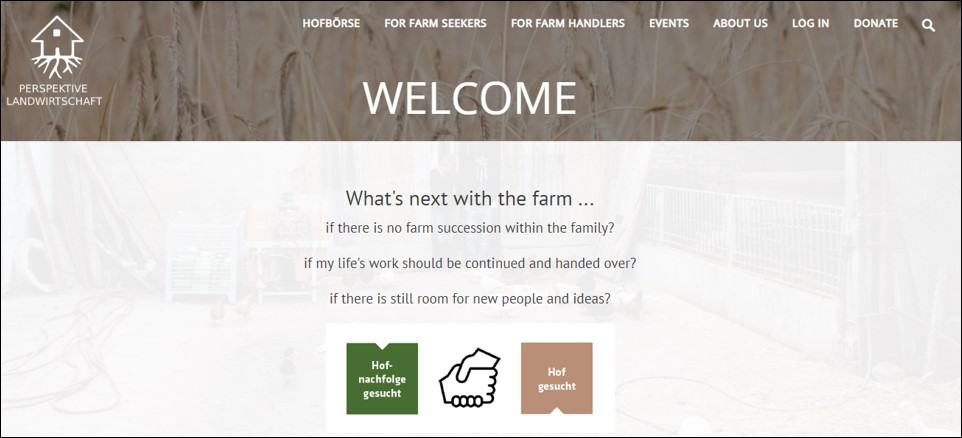

France
Répertoire Départ Installation (Directory Departure Installation)
In France, the Répertoire Départ Installation (RDI) is a national farm transmission tool led by experienced advisers within the French Chambers of Agriculture. This system allows farmers seeking to sell their farm or wishing to find a new partner to connect and be put in contact with candidates looking to farm. It publishes over 6,400 offers annually on its directory. The RDI also provides essential information on farm transfer and organises transmission meetings.
More information can be found at: https://www.repertoireinstallation.com/
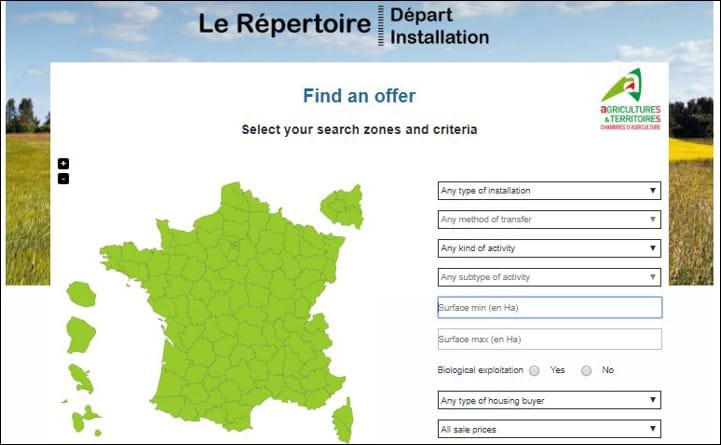
Germany
Hof sucht Bauer
Hof sucht Bauer is social enterprise in Germany that offers advice and information on farm succession and business start-up in agriculture. It aims to help preserve existing agricultural businesses and ensure the future survival of farming in Germany by facilitating the successful intergenerational transfer of farms from both inside and outside the family, depending on the circumstances. The organisation’s internet portal (hofsuchtbauer.de) offers a useful online matchmaking platform called ‘Hofbörse’ to connect and support farm owners with young, well-trained people who want to get established in agriculture throughout Germany. Hof sucht Bauer’s specialized advisory service also offers support to both sides involved in the consultation and handover process in a personal, yet professional manner to enable a successful transfer of the farm to occur. Hof sucht Bauer also organise nationwide information events that focus on domestic and non-family farm handover. Their seminars also include contributions and reports on successful succession from specialists such as tax consultants or lawyers and practitioners.
More information can be found at: https://www.hofsuchtbauer.de/
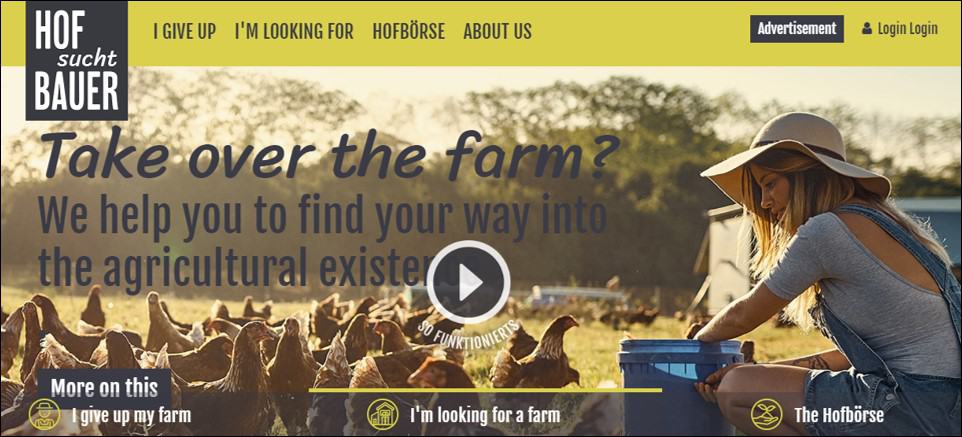

Italy
Banca delle Terre Agricole (National Bank of Agricultural Lands)
In Italy, Banca delle Terre Agricole, hereinafter referred to as ‘Banca’ effectively allocates farmland to new farmers. It is managed by ISMEA (Istituto di Servizi per il Mercato Agricolo Alimentare) and operates at a national level since its establishment in 2016. Banca provides a complete inventory of the supply and demand of agricultural land that become available in Italy as a result of abandonment of production activity and early retirement or land operations carried out by ISMEA.
Banca is a freely accessible tool that provides open information on the natural, structural and infrastructural characteristics of the land on offer, as well as on the terms and conditions of sale and purchase of the same. More information can be found at: http://www.ismea.it/banca-delle-terre/en
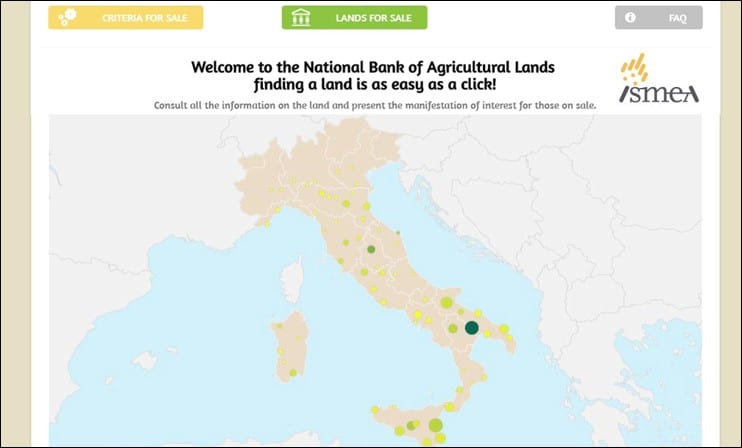
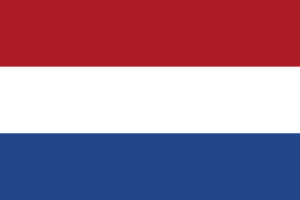
Netherlands
Landgilde
Landgilde is a Dutch initiative established by Land & Co that aims to match young and old farmers in order to facilitate extra-familial farm succession. The model is based on the idea of a guild, making it possible for beginning farmers of different levels of experience and skills to connect and meet with each other, and find working and learning opportunities with older farmers. Landgilde also offers information, guidance and training on farm succession and farm continuity.
More information can be found at: http://www.landgilde.nl/home/
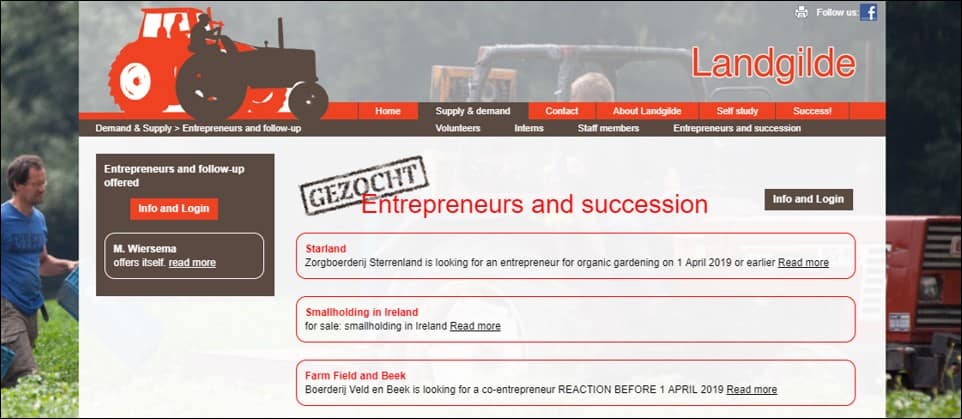
Netherlands
Boer zoekt Boer (Farmer Seeks Farmer)
Boer zoekt Boer is an online platform created by the Dutch Agricultural Young People Contact (NAJK) that brings retiring farmers without a successor together with young people who would like to take over a farm. The programme then guides both parties towards a successful intergenerational farm transfer process outside of the family.
More information can be found at: https://www.najk.nl/voor-bedrijfsopvolgers/boer-zoekt-boer/
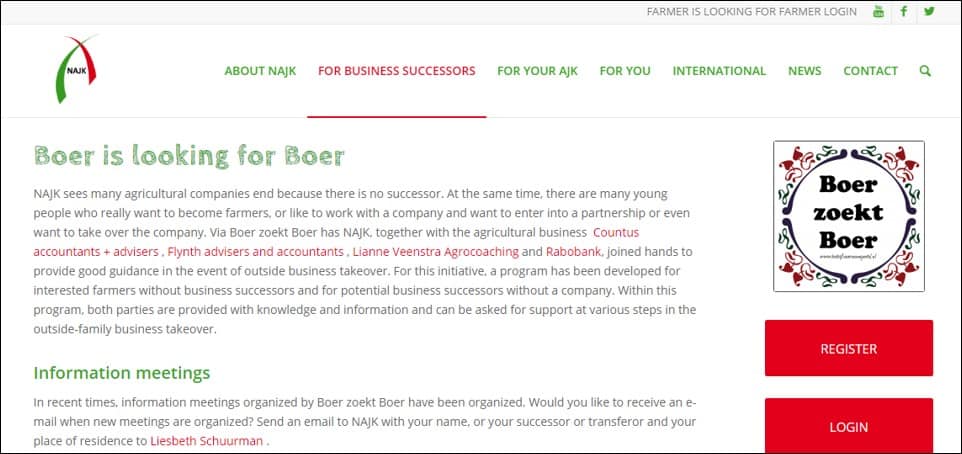
Civic Initiatives Supporting New Entrants into Farming in Europe
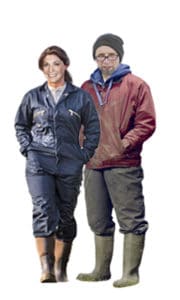 Interestingly, of the 10.8 million family farms in the European Union farms, two thirds are less than 5ha in size. As land is the core asset for productive agriculture, securing long-term access to additional land is thus imperative for young and new entrants to farming who want to put together farm holdings of an efficient size that will increase their productivity and viability. In the context of current trends of land concentration and price increase, several civic initiatives have been developed over the past decade throughout Europe in an effort to challenge commonly accepted perceptions of land ownership and farm succession. Civic Initiatives are networks and organisations from civil society which are operationally involved in supporting new entrants, promoting access to land and sustainable stewardship. The idea that land should be a public common is far from mainstream but is growing, in light of the emergence of a number of such initiatives in many European countries to support land mobility. These civic initiatives are mostly community and/or farmer-led initiatives which aim for a closer relationship between farmers and community members/consumers. They also engage with a broader range of stakeholders and attempt to protect the environment through agriculture as a ‘public good’ (Hagenhofer 2015).
Interestingly, of the 10.8 million family farms in the European Union farms, two thirds are less than 5ha in size. As land is the core asset for productive agriculture, securing long-term access to additional land is thus imperative for young and new entrants to farming who want to put together farm holdings of an efficient size that will increase their productivity and viability. In the context of current trends of land concentration and price increase, several civic initiatives have been developed over the past decade throughout Europe in an effort to challenge commonly accepted perceptions of land ownership and farm succession. Civic Initiatives are networks and organisations from civil society which are operationally involved in supporting new entrants, promoting access to land and sustainable stewardship. The idea that land should be a public common is far from mainstream but is growing, in light of the emergence of a number of such initiatives in many European countries to support land mobility. These civic initiatives are mostly community and/or farmer-led initiatives which aim for a closer relationship between farmers and community members/consumers. They also engage with a broader range of stakeholders and attempt to protect the environment through agriculture as a ‘public good’ (Hagenhofer 2015).
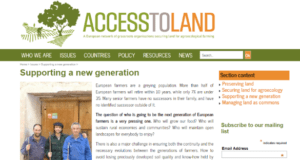 The European Access to Land network (please see: https://www.accesstoland.eu/) brings together such organisations from across Europe to share experiences, practical ways of assisting farmers in accessing land and promote the significance of land mobility for agroecological transition and generational renewal. Established in 2012, it functions as an informal network of about 20 organisations from Belgium, Spain, Italy, France, U.K., Lithuania, Germany and Romania. The network aims at reconsidering land as a common good where citizens, farmers and public authorities collaborate. The network’s main objectives are to consolidate and disseminate initiatives on access to land, and to put land issues in the spotlight.
The European Access to Land network (please see: https://www.accesstoland.eu/) brings together such organisations from across Europe to share experiences, practical ways of assisting farmers in accessing land and promote the significance of land mobility for agroecological transition and generational renewal. Established in 2012, it functions as an informal network of about 20 organisations from Belgium, Spain, Italy, France, U.K., Lithuania, Germany and Romania. The network aims at reconsidering land as a common good where citizens, farmers and public authorities collaborate. The network’s main objectives are to consolidate and disseminate initiatives on access to land, and to put land issues in the spotlight.
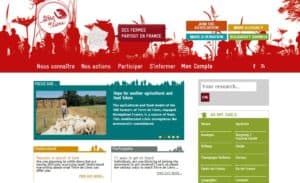 One of the most notable and well-known civic initiatives helping to facilitate land mobility in Europe is Terre de liens in France (please see: https://terredeliens.org/). Founded in 2003, Terre de Liens is regarded a major actor in the field of access to land for ecological agriculture. Terre de Liens directly acquires farmland, which it holds in perpetuity for current and future generations. Terre de Liens’ land is let to farmers, the majority of whom are organic and small scale. To acquire such land, Terre de Liens has created two financial tools: la Foncière, a solidarity investment company; and le Fonds, an Endowment Trust which collects investment or donations in cash or kind.
One of the most notable and well-known civic initiatives helping to facilitate land mobility in Europe is Terre de liens in France (please see: https://terredeliens.org/). Founded in 2003, Terre de Liens is regarded a major actor in the field of access to land for ecological agriculture. Terre de Liens directly acquires farmland, which it holds in perpetuity for current and future generations. Terre de Liens’ land is let to farmers, the majority of whom are organic and small scale. To acquire such land, Terre de Liens has created two financial tools: la Foncière, a solidarity investment company; and le Fonds, an Endowment Trust which collects investment or donations in cash or kind.
A study on European civic initiatives by Hagenhofer (2015) highlights that such bodies have the potential to become drivers of a new agro-social paradigm in European agriculture.
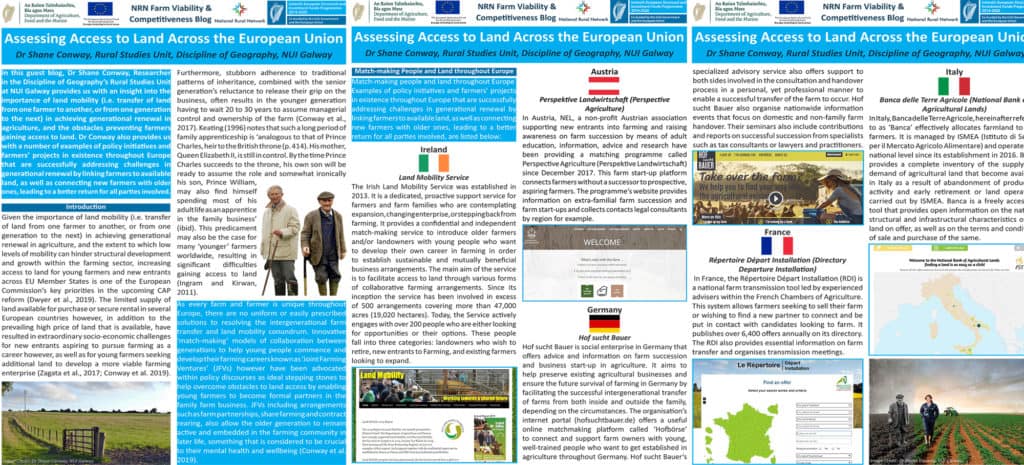
A printable version of this blog can be downloaded here.
Author Biography
 Dr Shane Conway is a Researcher in the Discipline of Geography’s Rural Studies Research Cluster at the National University of Ireland, Galway (NUI Galway). Shane’s research interests are in Rural and Agricultural Geography, with a particular focus on generational renewal in agriculture, the human side of farming and rural sustainability. He has published widely in peer reviewed academic journals, such as the Journal of Rural Studies and the International Journal of Agricultural Management and is currently leading Ireland’s participation in the International FARMTRANSFERS Project.
Dr Shane Conway is a Researcher in the Discipline of Geography’s Rural Studies Research Cluster at the National University of Ireland, Galway (NUI Galway). Shane’s research interests are in Rural and Agricultural Geography, with a particular focus on generational renewal in agriculture, the human side of farming and rural sustainability. He has published widely in peer reviewed academic journals, such as the Journal of Rural Studies and the International Journal of Agricultural Management and is currently leading Ireland’s participation in the International FARMTRANSFERS Project.
Dr Conway is also a member of Ireland’s National Rural Network (NRN) research team at NUI Galway, where he has initiated and led the design, development and implementation of a number of multi-method communication strategies being employed by the NRN to highlight and promote projects funded under Ireland’s Rural Development Programme (RDP) 2014-2020 on behalf of the Irish Department of Agriculture, Food and the Marine (DAFM) and the Department of Rural and Community Development (DRCD), such as the European Innovation Partnership for Agricultural productivity and Sustainability (EIP-AGRI) Operational Groups. Shane is a member of the Whitaker, Ryan and Moore Institutes at NUI Galway as well as the European Network for Rural Development’s (ENRD) Thematic Group on ‘Smart Villages’ based in Brussels, Belgium. He is also a judge for Ireland’s annual National Farming for Nature awards.
Twitter: @ShaneConwayNUIG & @NUIGalwayRural
LinkedIn: Profile
ResearchGate: Profile
References
Conway, S.F., McDonagh, J., Farrell, M. and Kinsella, A. (2019) Human dynamics and the intergenerational farm transfer process in later life: A roadmap for future generational renewal in agriculture policy, International Journal of Agricultural Management, 8(1), 22-30.
Conway, S.F., McDonagh, J., Farrell, M. and Kinsella, A. (2017) Uncovering obstacles: The exercise of symbolic power in the complex arena of intergenerational family farm transfer. Journal of Rural Studies, 54, 60-75.
Dwyer, J., Micha, E., Kubinakova, K., Van Bunnen, P., Schuh, B., Maucorps, A. and Mantino, F. (2019) Evaluation of the impact of the CAP on generational renewal, local development and jobs in rural areas. Technical Report. European Commission.
Hagenhofer, K. (2015) Civic Initiatives Supporting New Entrants into Farming in Europe: Drivers Of A New Agro-Social Paradigm?” Vienna: Department of Sustainable Agricultural Systems. Maters Thesis, University of Natural Resources and Life Sciences, Vienna.
Ingram, J. and Kirwan, J. (2011) Matching new entrants and retiring farmers through farm joint ventures: insights from the fresh start initiative in Cornwall, UK. Land Use Policy, 28(4), 917-927.
Keating, N. C. (1996) Legacy, aging, and succession in farm families. Generations 20(3), 61-64.
Zagata, L., Hrabák, J., Lošťák, M., & Bavorová, M. (2017) Research for AGRI Committee – Young farmers – policy implementation after the 2013 CAP reform, European Parliament, Policy Department for Structural and Cohesion Policies, Brussels, Belgium.



